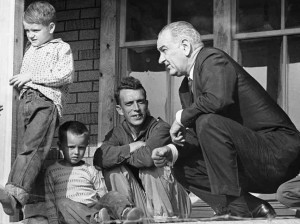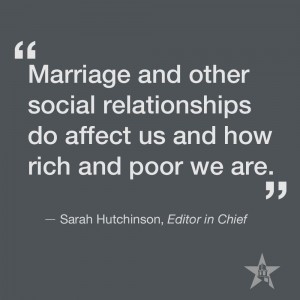Fifty years ago President Lyndon B. Johnson declared “unconditional war on poverty in America” and promised that “we shall not rest until that war is won.” The news recently has been full of assessments evaluating the war on poverty’s success and asking to what extent we have achieved victory. Most of these assessments conclude that, though the war on poverty has had some specific and limited successes–especially in decreasing poverty among the elderly–on the whole it has fallen well short of the lofty ambitions that inspired it and the goals it set for itself.

What might an updated war on poverty look like in the 21st century? In recent decades we have learned quite a bit about the factors that lead to and keep people in poverty. In particular, it has become abundantly clear that stable marriages and families are among the best predictors for avoiding poverty. Nick Schulz, in a useful little volume entitled Home Economics: The Consequences of Changing Family Structure, summarizes much of the evidence linking poverty to changes in family structure such as increases in divorce, single-parent households, and children born out of wedlock. Just a few of the findings that he reports:
-
Ron Haskins and Isabel Sawhill of the Brookings Institution, after reviewing Census Bureau data, found that “if young people finish high school, get a job, and get married before they have children, they have about a 2 percent chance of falling into poverty and nearly a 75 percent chance of joining the middle class by earning $50,000 or more per year.”
-
Sara McLanahan and Gary Sandefur, in their book Growing Up with a Single Parent, report that “adolescents who have lived apart from one of their parents during some period of childhood are twice as likely to drop out of high school, twice as likely to have a child before age twenty, and one and a half times as likely to be ‘idle’–out of school and out of work–in their late teens and early twenties.”
-
A group of researchers from the Pew Research Center “compared the median household incomes of married adults with unmarried adults in 1960 and again in 2008. Half a century ago, the gap in household incomes was 12 percent. In 2008, the gap had grown to over 40 percent.”
This is just a small sampling from a large body of research confirming what is by now an indisputable fact: if you want to reduce poverty, you should want as many children as possible to grow up in stable families with their own two married parents.
This evidence could provide the fulcrum for a bipartisan coalition devoted to strengthening marriage and the family. Liberals, committed to the poorest and most vulnerable members of society and concerned with income inequality, should make common cause with conservatives, who emphasize the traditional family unit as a building-block of society. A coalition of this sort, seeking a common, pro-family reform agenda, could make new headway in the fight against poverty.
Although family issues are often politically divisive, some reform proposals could reach across the partisan divide. A waiting period between the filing of divorce papers and the actual finalization of a divorce, during which couples could be offered access to marriage counseling, might reduce the rate of divorce. Other reforms, such as increasing the child tax credit, might ease financial strains on families. More creatively, we might make the credit available only to married couples, or introduce an additional tax credit targeted specifically at married couples that choose to forego a second income so that one parent can stay at home full-time with their children.
Strengthening marriage and the family is a daunting task. Family decline has been a product of complex cultural factors, and public policy is a blunt instrument for effecting large cultural change. Fifty years ago, however, Lyndon Johnson told Americans, “Very often a lack of jobs and money is not the cause of poverty, but the symptom. The cause may lie deeper in our failure to give our fellow citizens a fair chance to develop their own capacities, in a lack of education and training, in a lack of medical care and housing, in a lack of decent communities in which to live and bring up their children.” If we today remain committed to giving our fellow citizens “a fair chance to develop their own capacities,” we will require creative ideas about revitalizing the American family.
A longer version of this column will appear as an essay in the Lent issue of The Cresset (http://thecresset.org).


